Campus Health leadership rose to COVID challenge
The four-member team won a shared Massey Award for its “tireless commitment” during the pandemic and beyond.
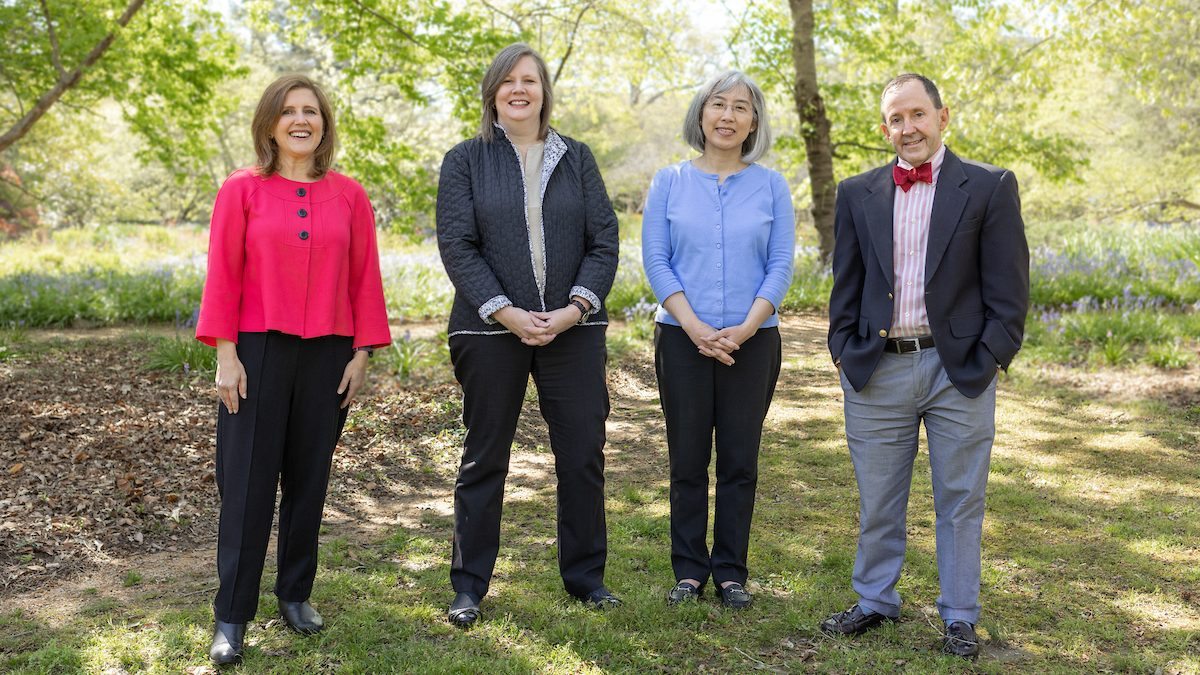
When the COVID-19 pandemic hit, Campus Health could have let UNC Health Care — the major medical center just a few steps from its offices in the Taylor Building — handle student patient care. The student health care center could have relied on the county health department for testing and contact tracing.

Ken Pittman.
But Executive Director Ken Pittman and his predecessors had worked too hard to establish Campus Health as the place students trusted to provide a high level of care, “not simply a Band-Aid station,” he said. “When it was time to really step up, we were well positioned to take a leadership role.”
Campus Health leaders were the first to work on COVID-19 testing for the University community. They took on the job of tracing the contacts of students who tested positive for the virus, established the Carolina Vaccination Clinic, and set up electronic portals for COVID-19 testing and vaccination records.
For that extra, lifesaving effort, as well as other accomplishments not related to the pandemic, a shared 2023 C. Knox Massey Distinguished Service Award went to the four members of the Campus Health leadership team: Pittman; Dr. Thevy Chai, medical services director; Amy Sauls, pharmacy director; and Michelle Camarena, director of nursing and performance improvement.
This story is part of The Well’s coverage of the C. Knox Massey Distinguished Service Awards, which recognize “unusual, meritorious or superior contributions” by University employees. Look for new recipient profiles to come or find others you may have missed.
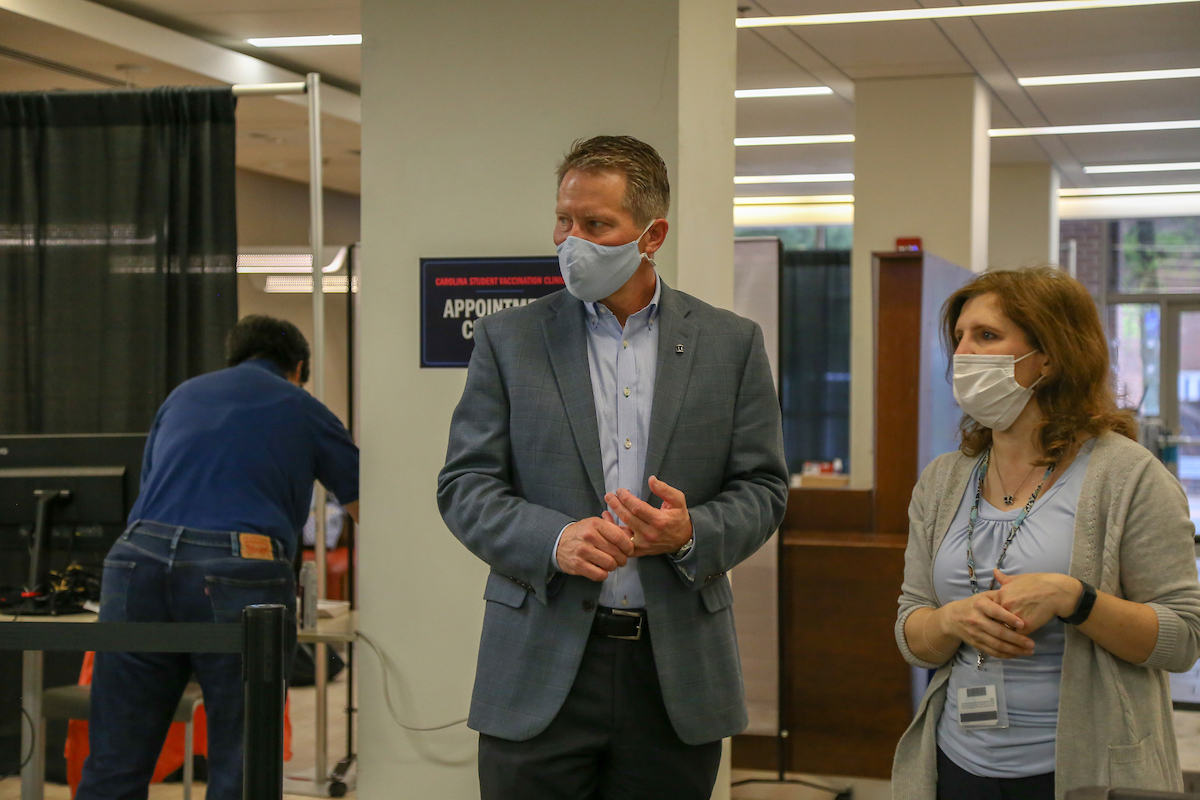
Chancellor Kevin M. Guskiewicz speaks with Amy Sauls when the Carolina Student Vaccine Clinic opened March 31, 2021. (Brandon Bieltz/UNC-Chapel Hill)
Praise from nominators
The four have a combined 74 years of service with the University and were nominated together as a team. “The work of Campus Health requires critical leadership functions that are mutually dependent,” Bettina Shuford, associate vice chancellor for student engagement, wrote in her nominating letter. “Carolina would not have made it through this period without their tremendous expertise, good humor and tireless commitment to the University and our students. Perhaps no team has ever demonstrated the ideals of the Massey Distinguished Service Award better — and deserves the recognition more.”
Here are some of the numbers:
- 63,000+ COVID-19 tests completed.
- 22,000+ vaccines administered.
- 9,500 positive student COVID-19 cases managed.
Fellow nominator Dr. Amir Barzin, who directed the Carolina Together Testing Program during the pandemic, wrote that he was “amazed” by the team’s contributions.
“This team has worked countless hours over the past three years in ensuring the safety and well-being of the students at UNC,” wrote Barzin, associate professor in the School of Medicine’s family medicine department and medical director for UNC Health Virtual Care Services and the UNC Nurse Connect. “I have watched firsthand how much effort, time and dedication they have each put into the work they do. It is truly astounding and deserves the highest honor.”
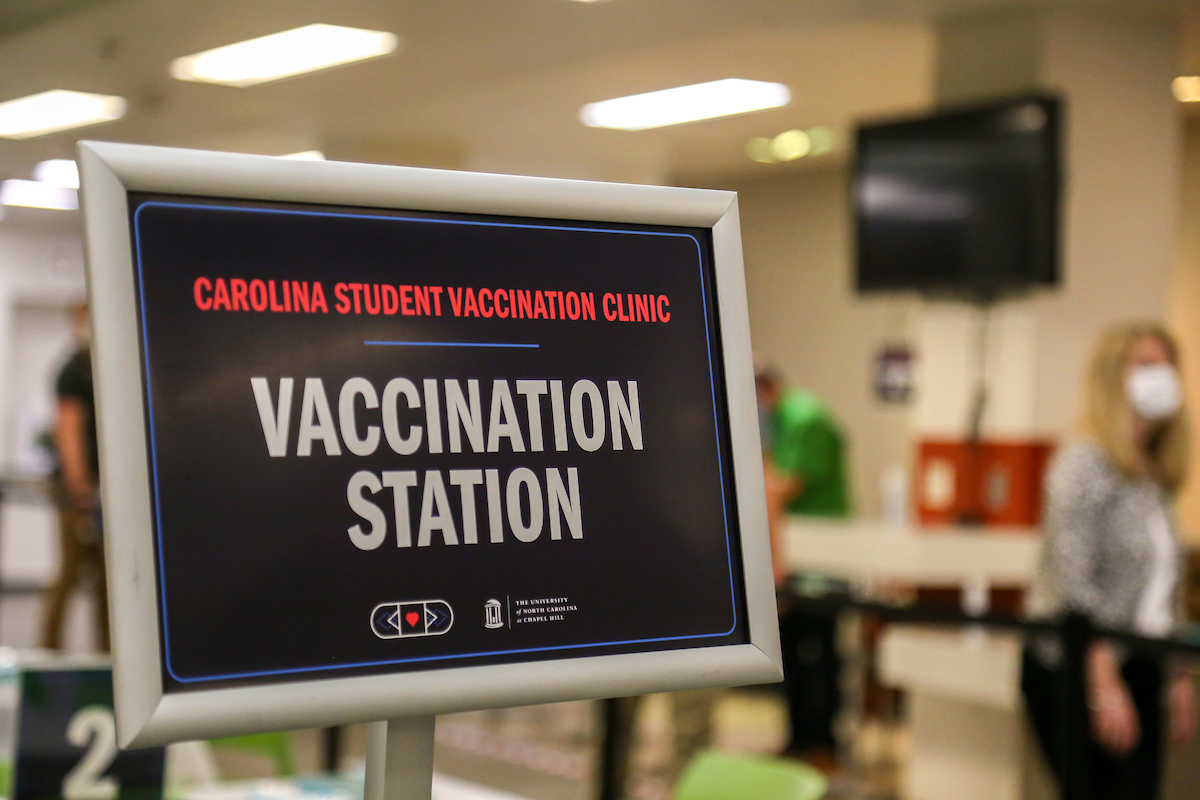
Campus Health administered 22,000+ vaccines during the pandemic. (Brandon Bieltz/UNC-Chapel Hill)
COVID challenges met
Each member of the Campus Health leadership team took on new roles and expanded responsibilities to meet the challenges of the pandemic. As emergency essential employees, they worked on campus throughout the crisis. They strategized about how to run a testing program and set up a vaccine clinic. They also did the hands-on work required, donning personal protective equipment and swabbing noses, coordinating vaccine supply and setting up a vaccination clinic in the campus Wendy’s location.
Pittman, who oversees day-to-day operations and guides the 180-member staff, was the face and voice of Campus Health throughout the crisis. “I was saying ‘yes’ before I even knew how we would do it,” he said. “But I was surrounded by a leadership team that really took the reins and helped me and others figure out how we were going to do the best that we could and provide the best value to our students.”

Thevy Chai
As medical services director, Chai answered clinical questions from health care providers, staff, community members and parents and interacted directly with student patients, both in person and virtually. “I still remember a student saying, ‘With COVID, am I going to stop breathing in the middle of the night when I sleep?’” she recalled.
Pittman praised Chai’s clinical expertise in infectious disease and her proactive approach. “We benefited so much from that and from the respect that all of our UNC Hospital and School of Medicine clinicians have for her and her expertise.”
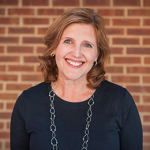
Amy Sauls
As pharmacy director, Sauls led the contact tracing and immunization rollout, aided by Camarena. When Pittman said “yes,” he counted on Sauls to figure out how. “Amy is scary smart about everything. She can think very systematically about how to marshal resources to get it done,” he said.
Before students returned to campus in fall 2020, Campus Health needed contact tracers, lots of them, and Sauls began to train as many staff members as possible. “We’re talking everybody — radiology technologists, lab technicians, athletic trainers,” she recalled. “They all wanted to contribute and wanted to make sure our campus stayed as safe and healthy as possible.”

Michelle Camarena
With her clinical and nursing expertise, Camarena became the team’s primary contact with the county health department. “We were accustomed to dealing with infectious disease on a college campus,” just not on a pandemic scale, she said. She had a good working relationship with the health department staff — good enough to text individuals by phone when necessary — and familiarity with infectious disease guidelines and protocols.
At 5:30 a.m. each morning, Camarena checked and communicated lab results. She was proud of the specificity that testing and contact tracing gave the team about the infection rate. In fall 2020, when the positives reached the 600+ range, “we had to raise the red flag,” she said. At a meeting that included the chancellor, “we made a point of saying, ‘It’s everywhere,’ knowing that we had the data to back that up.” The assessment led to students being sent back home and classes going virtual.
Beyond the pandemic
Dedicated as the team was to its pandemic duties, Campus Health also expanded its other services and completed $3 million in building renovations during this chaotic time:
- Implemented the University’s first telehealth counseling contract.
- Launched a new Campus EMS.
- Developed a dental program, Campus Smiles.
- Administered 8,000+ flu vaccinations.
- Renovated first-floor space for sports medicine, specialty clinics, same-day care and central registration.
- Replaced X-ray technology and added lab equipment to expand testing capabilities.
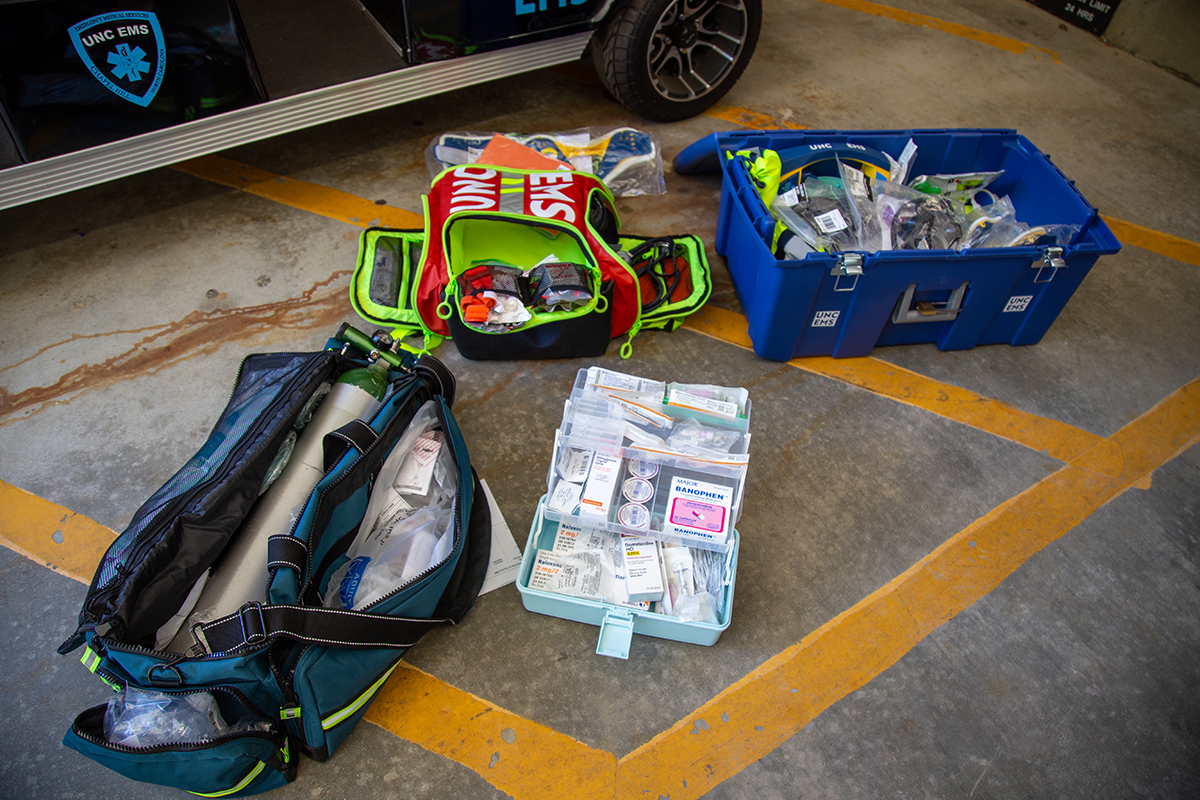
Packed on the UNC Campus EMS golf cart is everything you’d find in a typical ambulance.
Campus Health responds to urgent care needs and helps students manage chronic conditions. In an average year, staff provide care in 110,000 in-person visits, respond to 80,000 calls or emails and fill 70,000 prescriptions. All these numbers add up to Campus Health’s 78% penetration rate, the number Pittman is proudest of.
“That means that 78% of all the students at Carolina who are eligible to access our care do so at least once during the year,” he explained. Considering that the national average is only 48%, he sees this as a very good sign.
But he’s set his sights even higher. A student government leader told him that students expect Campus Health to match Carolina’s high overall ranking in public universities, and he agreed.
“There’s not a U.S. News ranking of college health centers that I’m aware of,” he said. “If there was, I can tell you this team would be trying to get there. That’s just who we are.”




